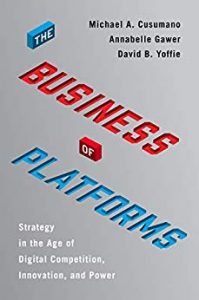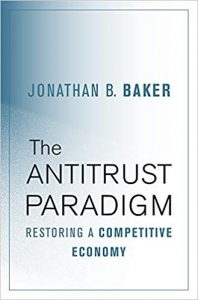Digital platforms have been very much a focus of policy attention of late, with reports on the problems and challenges they raise published by the UK (several, including the Furman Review), Australia, Germany, European Commission & others. The platforms these various reports discuss are the big ones, and the concerns range from competition policy to employment practices to online harms.
A terrific new book by Michael Cusumano, Annabelle Gawer and Devid Yoffie, The Business of Platforms, points out though that most of the digital platforms that are not big are dead: four in five fail. The book is aimed at people running or starting platforms, offering advice on (as the subtitle puts it). “Strategy in the Age of Digital Competition, Innovation and Power).” The book very nicely links business strategy to the underlying economic characteristics of digital, and I think is probably in this respect the best tech business book since Shaprio and Varian’s (now old, 1998) Information Rules.
It starts by pointing out that there is nothing inevitable about network effects (direct and indirect) kicking in: they have to be nurtured: “Companies and governments have to make the right srategic and policy decisions in order to drive strong network effects.” These can include technical standards, for example, or ensuring competition thrives at the right times and points. The book also distinguishes between two types of platform, requiring different strategies (although there are a groing number of hybrids). Innovation platforms create value by enabling third parties to develop products or service on top of the platform, while transaction platofrms create value by matching different sides of a market.
Key challenges for all, though, involve solving the ‘chicken and egg’ problem (because different sides of the platform depend on each other) by appropriate pricing and cross-subsidy, and figuring out a business model. (And in my view the dependence of so many on advertising is a major weakness & can’t be sustained). The book uses the framework to explore the many platform failures. It also has a chapter on how non-platform incumbents can respond to the digital challenge (it’s tough…), and looks briefly at issues such as the use and governance of data, and also the importance of working with regulators rather than against them and recognizing the responsibilities that come with (market and other) power. “Every major company we cited in this book has been the subjject of government investigations, local regulatory oversight, and intense media scrutiny.”
All in all, highly recommended. If you know the economics, the case studies and management literature covered will be informative, and if you know the business details, the economic framework should be useful. I very much enjoyed reading it.


